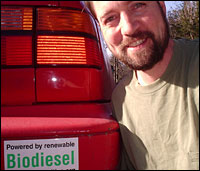The way that Rob Del Bueno backed into the world of biofuel almost by accident, as told in the article “Small Potatoes,” is emblematic of the way most folks get engaged in grassroots biofuel development. It starts with a desire to use a renewable fuel to power your life long before a GMO-happy megacorporation was going to start reliably supplying you with it, and then it turns into an obsession that alters your whole outlook.

Erik Hoffner.
At about the same time that Rob was getting started, friends of mine were interested in creating a biodiesel-buying co-op together. Discovering how easy biodiesel was to make, we then began to wonder if we ought to have our own local bio-refinery instead, collecting grease and turning it into premium fuel. We were enthusiasts, with no knowledge of the topic. A few had business experience, one was a farmer, a few were engineers of the wrong kind — but I was none of these. I was trained as an environmental educator and grassroots organizer, and had held a number of jobs related to those topics, but had no idea what we were getting into.
The project has now gained momentum to the point that it’s attracted a lot of new interest and talent, as well as capital, and has become formalized under the direction of Co-op Power (also profiled in “Small Potatoes”), a newly formed consumer-owned renewable-energy cooperative. The hazy dream-filled meetings we had around dozens of tables in homes, bars, and nonprofit boardrooms in the early years have given way to slightly larger tables peopled with MBAs, entrepreneurs, investors, and businesspeople, to debate debt-to-equity ratios, revenue forecasts, feedstock contracts, balance of plant plans, and things even more unspeakable.
This all goes beyond the surreal for me, and the learning curve for much of it I’ve found not only steep, but slippery. The fact that the refinery exists only on paper after the thousands of hours we’ve put into this ought to discourage, but we remain optimistic. We’re blazing forward, confident that we’ll be ready to break ground any time now on a plant that will convert recycled vegetable oil into millions of gallons of biodiesel annually.
There are numerous projects around the U.S. that started out similarly, and those involved have become knowledgeable about all manner of topics that were previously of little interest. Whether it’s zoning, fire codes, or securities law, it’s all necessary to know if you want to build a successful community asset like a bio-refinery.
Our efforts are emblematic of how grassroots activists need to be ready to get active in new ways to create the change we want to see in the world … whether that means launching a limited liability company, staring down endless spreadsheets, or starting a daycare center. Just consider the recent award of the Nobel Peace Prize to a college professor who started the world’s first micro-credit bank, not because of a lifelong dream, but because of a desire to aid the desperately poor in his community.
Grassroots work is about so much more than just fighting injustices and polluters and malignant corporations. It’s also about showing the way to another future. The nascent organic farming movement was premised on a different view of food, nutrition, and stewardship, and has become one of the most powerful movements of the last few decades. Its message is now mainstream, and it has birthed many positive trends, like the community-supported-agriculture phenomenon.
But even the most successful horticulturist has to learn to excel at marketing, or the farm produces only weeds. The new skills I’ve developed at Co-op Power are ones I didn’t plan on having, ever, but they’re necessary. And the skills we’ve learned are helping this group stake out a new territory, where communities pool their capital to develop renewable-energy assets in service to cleaner air, increased local energy independence, regional economic development, and more.
We don’t believe biodiesel is the answer to all of our problems forever. It’s just a bridge to another place. For now, we’re happy to know how to put together the planks that can get us there — and wherever else we want to go.

